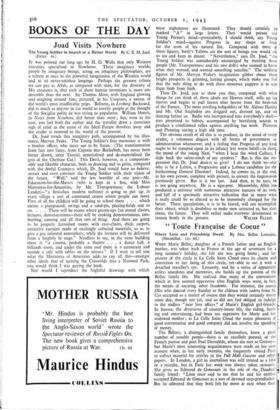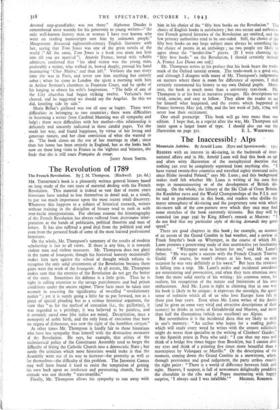" Toute Francaise de Coeur"
WHEN Marie Belloc, daughter of a French father and an English mother, was taken back to France at the age of seventeen for a long summer's holiday, she felt she was going home; and her picture of the circle at La Celle Saint Cloud owes its charm and conviction to her being of this circle yet • able to see it with a detached traveller's eye. Leisurely, and by a series of apparently artless anecdotes and memories, she builds up the pattern of the Belloc family life. She realised that many of the conventions which at first seemed oppressive after English ways were, in fact, the means of securing other freedoms. For instance, the jeunes filler who danced every Sunday at the château with cadets from St. Cyr accepted as a matter of course that they would certainly marry some day, though not yet, and so did not feel obliged to indulge in the endless "near love affairs" of Marie's English girl-friends. In Sussex, the diversions of country-house life, the riding, hunt- ing and entertaining, had been too expensive for Marie and her widowed mother ; at La Celle Saint Cloud the major pleasures of good conversation and good company did not involve the spending of Money.
The Bellocs, a distinguished family themselves, knew a great number of notable people—there is an excellent portrait of the French patriot and poet Paul Deroulede, whom she met at Croissy- but Marie's most interesting acquaintances were made on her own account when, in her early twenties, she frequently visited Paris to collect material for articles in the Pall Mall Gazette and other papers. In London, a girl in journalism was still treated as a joke or a mistake, but in Paris her work was always taken seriously. She gives us Edmond de Goncourt in the role of the .Daudets' family friend : "Leon once said to me that he and his mother accepted Edmond de Goncourt as a sort of devoted step-grandfather. But he admitted that they both felt far more at ease when their devoted step-grandfather was not there." Alphonse Daudet is remembered most warmly for his generosity to young writers—" the only well-known literary man or woman I have ever known who went on reading manuscripts sent him by unknown people." Maupassant discussed eighteenth-century English literature with her, saying that Tom Jones was one of the great novels of the world (" All the same, Tom Jones is a book you must not look into till you are married "). Anatole France, bored with voluble admirers, confessed that "his ideal visitor was the young man, preferably a writer; who walked in, bowed deeply, pressed his hand murmuring Cher Maitre,' and then left." Verlaine she met every time she was in Paris, and never saw him anything but entirely sober ; when he came to London she spent a morning with him in Arthur Symons's chambers in Fountain Court, and he spoke of his longing to obtain his wife's forgiveness. "The bells of one of the City churches had begun striking twelve. Verlaine's face cleared, and he suggested we should say the Angelus. So this we did, kneeling side by side." Marie Belloc's girlhood was not all easy or happy. There were difficulties in belonging .to two countries ; there were difficulties in becoming a writer (here Cardinal Manning was all sympathy and help) ; there were difficulties with her mother—this relationship is delicately and sincerely indicated in these candid pages. Yet she made her way, and found happiness, by virtue of her loving and generous nature, and her clear conviction of what she wanted to do. The book doses on the eve of her marriage in 1896; since then her home has been entirely in England, but as she looks back now on these long visits to France in the 'eighties and 'nineties, she finds that she is still route Francaise de coeur.
JANET ADAM SMITH.



























 Previous page
Previous page